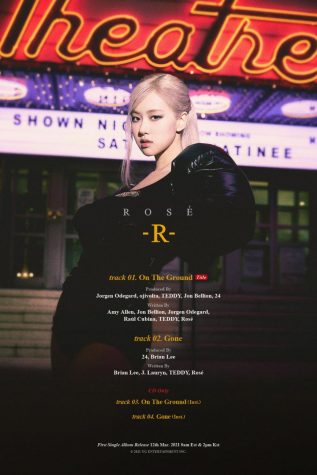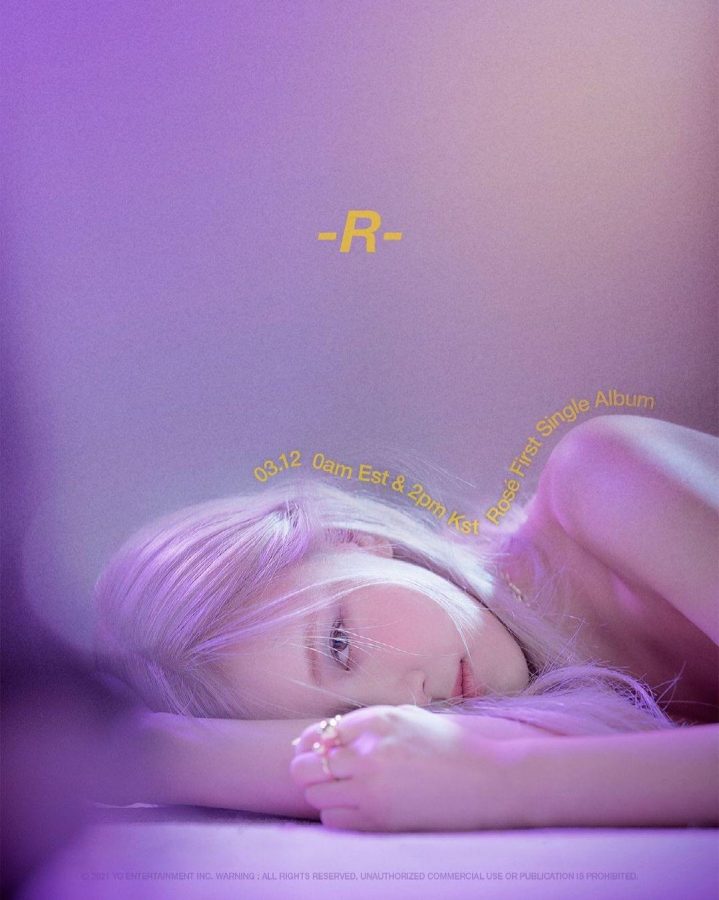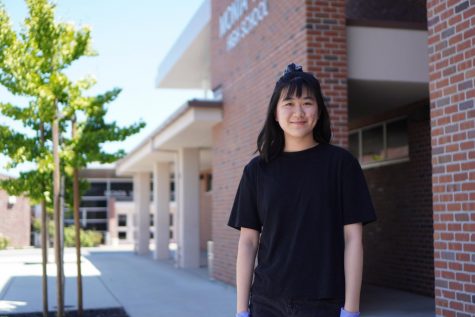Blackpink Rosé’s debut EP ‘R’ is an underwhelming miss
Although artistically crafted, ‘R’ is generically forgettable and doesn’t present all of Rosé’s soloist potential
March 14, 2021
On March 11, Korean girl-group Blackpink’s main vocalist Rosé released her very first two-track mini album titled “R” — outstripping the record of pre-order sales for a female K-pop soloist. Rosé’s debut as a solo artist marks the second individual project within the band’s four-person lineup, with member Jennie launching her chart-topping digital single “SOLO” in 2018. With “SOLO” sitting over 600 million YouTube views and 275 million Spotify streams as well as sweeping 2020’s Best Digital Song “Bonsang” (the second most prestigious Korean music show award), Rosé’s album was highly anticipated in the K-pop scene after a two-year postponement.
Although Blackpink as a group are often coined as the hallmark of the flashy “girl-crush” or frosty “boss woman” archetype, Rosé’s musical forte lies in softer melodic ballads and acoustic guitar accompaniments. As a result, her single was expected to be much more watered-down in explosive impact than “SOLO,” opting for fluttery verses over rap and a vocal run over a dance break. However, “R” as a musical work is rather unbalanced. The rich emotion of the side track “Gone” is attractively elegant, but the bland delivery of the title song “On The Ground” weakens the mini album’s quality, failing to fully showcase Rosé’s poetic flair.
“On The Ground”
As the title performance track of “R,” “On The Ground” chronicles the falsities of glitzy fame and the romanticism of dreams — the lyrics stating that “gold is [just] plastic.” Although the song’s lyrical meaning is unknown, the verses are hypothesized to echo the monologue of a K-pop trainee turned superstar who has “made it,” a similar narrative to Rosé’s thriving career as a well-known idol. This rags-to-riches theme is mirrored with the lines “I used to have a hole in the wall with a mattress” and “I worked my whole life,” which may speak to her four year training period.
Now “way up in the clouds” as a part of Blackpink, Rosé metaphorically sings to how everything she supposedly needs is “on the ground” — a humble appreciation for her roots, practicality and normalcy. This criticism of her flourishing occupation was particularly surprising to hear, especially given Blackpink’s cliché, break-your-heart and falling-in-love discography. Rosé’s authentic reflection brought an air of open vulnerability and a breath of sincerity to the track, making “On The Ground” very heartwarming and bittersweet.

What makes “On The Ground” atypical is that the track is entirely in English and features zero screentime of the song’s choreography in the music video — one of the defining highlights in K-pop. With K-pop being a more performance-based industry than a vocally-based niche, “On The Ground” misses K-pop’s quirks completely and is instead more suited for the Western market. Although this doesn’t detract from the song’s value in any way, it does give the song more of a stylistic touch, as Rosé’s first language is English.
Soundwise, “On The Ground” closely resembles a gentler mashup of Blackpink’s “Lovesick Girls” and Taylor Swift’s 2012 girl-next-door aura. The song opens with a sweet-sounding guitar instrumental paired with a fast-paced, successive vocal execution; this juxtaposition in production gives the song a lethargic, suffocating ambience, presenting an interesting opener. Through dragging out the pronunciation of each syllable, the build-up to the chorus almost has a layer of fatigue or exhaustion, enhancing the song’s lyrical meaning. This musical choice is very engrossing and keeps the listener excited for the chorus.
However, the EDM chorus itself is not as tasteful as the first verse; the switch in genre isn’t very seamless and is slightly jarring to listen to. In K-pop, the chorus is typically the iconic “killing part” or the signature hook of the song, the most memorable and “singable” by fans that brands the comeback as a whole. However, the chorus is unfortunately empty with a flat repetition of the words “on the ground,” making the track disappointedly forgettable. The soft yet laid back appeal of the song is certainly present, but this charm is quickly lost through the uneventful chorus; as a result, “On The Ground” sounds incomplete and disjointed.
Overall, “On The Ground” is not a particularly impressionable display of Rosé’s vocal range and doesn’t tap into her potential as a soloist. Although her creative expression is evident through the lyrics, the song falls short of expectations.
“Gone”
“Gone” is the b-side track of “R,” lacing more heart-wrenching sentimentality in comparison to “On The Ground.” Although “Gone” is not as private to Rosé’s career contemplations, its lyrics recount the loss of a love through delicately honeyed vocal execution — arguably Rosé’s speciality. As Rosé sings, “Am I the story that’s sad and true? / I can feel the pain, can you?” the helpless and defeated character of the chorus makes “Gone” heartbreaking. The sheer emotion in Rosé’s voice backed with the lonely guitar strumming creates a pleasant sense of comfort and solace, which was predicted from Rosé’s previous English covers.
A more fruitful title track for “R” would’ve been stitching “On The Ground”’s lyrics with the vocal quality and rough melody of “Gone” to be more characteristically Rosé. Even so, “Gone” stands as a classic Rosé track and presents her artistic style harmoniously in an intimately familiar, yet novel fashion.
Album Thoughts
“R”’s charismatic shortfall lies in the lack of flavor and ingenuity in “On The Ground,” with “Gone” standing as a well-polished side track. The experimentalism is innovative, but not nearly as promising as it could’ve been — there seems to be more of Rosé’s talent that was left unsaid with “R.” While the two-year wait did inflate the buzz and public reception of the mini album, “R” still does not live up to the legacy of “SOLO.” Although the choice to deviate from Blackpink’s song formula can be respected, Rosé can deliver so much more than what “R” offers.




























